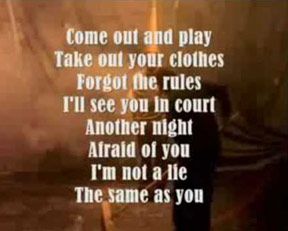Creativity
Is Angst Behind All Great Creativity?
Angst may not be the best catalyst for your creativity.
Posted June 17, 2013

Image courtesy of Martyna Adamczyk
I often hear people talk about angst-ridden creative people, and I've had numerous people ask me as a psychologist whether angst is in fact a necessary ingredient for creativity.
Since angst means different things to different people, I decided that the best way to make sure we are all on the same page is to start with some definitions:
Angst (n.) (ängkst)
1. A German word referring to "an acute but nonspecific sense of anxiety or remorse". Intense emotional strife. (Collins English Dictionary, 10th ed)
2. (Specific to existential psychology) A normal existential experience; "Angst is...my becoming aware that my existence can become lost, that I can lose myself and my world, that I can become nothing." - Psychologist Rollo May
2. Fanfiction writers use the word to help categorize some forms of fanfic: “Putting the characters and by extension the readers through deep emotional and possibly physical pain.”
In this post I am emphasizing the first definition, which seems to be the one most often associated with the "tortured artist."
Mental Illness
Some people take the definition of angst even farther. They believe writers need to be at least a little touched by madness. Interestingly, there is a strong positive correlation between bipolar disorder (aka manic depression) and creativity. More recently, researchers have been recognizing a similar correlation between creativity and disorders on the schizotypy spectrum, including schizophrenia.
According to Frederick Goodwin and Kay Redfield Jamison, both giants in the study of bipolar disorder:
It is counterintuitive that such a destructive illness could be associated with imagination or great works of art. Yet the perceived association is a persistent cultural belief and one that is backed by data from many studies… The argument is not that manic-depressive illness and its related temperaments are essential to creative work; clearly they are not. Nor do we argue that most people who have bipolar or recurrent depressive illness are creative; they are not. The argument is, rather, that a disproportionate number of eminent writers and artists have suffered from bipolar spectrum disorders and that, under some circumstances, creativity can be facilitated by such disorders.
From Michelangelo and Jackson Pollock to Samuel Taylor Coleridge and Percy Bysshe Shelley, from Kurt Cobain and Billy Corgan to Ernest Hemingway and Stephen King, depression or bipolar illness seems to be disproportionately common in creative geniuses.
The problem is that, according to creativity expert (and fellow Psychology Today blogger) Dr. James Kaufman (no relation), "As a society, we want to believe in [the tortured artist] very badly. It’s a great story... And it obviously has bearings in reality, but it’s one that is easy to embrace a little too much.”
In other words, the stereotype is so strong that people without psychological disorders may feel like they have to fake them to be accepted by the artistic community. (I Googled "tortured artist" and "angst" together and got 53,200 hits. Powerful stereotype!)
Is Angst Necessary?
Many people believe that if bipolar disorder, depression, and disorders on the schizotypy spectrum are common in creative geniuses, and angst is a description of how people with those disorders often feel, that must mean that angst is necessary to the creative process. But is it true?
Looking at the psychological research…no. Interestingly, people who are creative have more in common with people who are bipolar than they do with “normal” people, but the commonalities lie not so much in the mood disturbances as in idiosyncratic thinking patterns, enthusiasm and passion for their art, how easily they can produce new and strange ideas and connections. In many cases, people who have bipolar disorder and are creative are better able to express themselves creatively when they are being appropriately treated for their disorders.
Part of what makes being creative with a mental illness so difficult is the behaviors that result. Alcoholism is found in over 50% of the people with bipolar disorder. Abuse of other substances is also extremely high. Periods of despair can be so intense that the individual can hardly get out of bed, let alone create something. And of course the rate of suicide and suicide attempts is much higher than in creative people who aren’t also struggling with a mental illness.

Sample of Cobain's Smells Like Teen Spirit lyrics
Perhaps there is an overlap between “creative” genes and bipolar / depressive / schizotypy genes. (That is, we do not have evidence that creativity causes mental illness or that mental illness causes creativity; both may be caused by a third factor.) And while some people, like Kurt Cobain, feel much more creative when they’re in the manic phase of bipolar disorder, they may also be less coherent (Smells Like Teen Spirit lyrics, anyone?), and they also have to deal with the crash of depression (Cobain committed suicide). Research also suggests that over time depressive/bipolar illnesses gnaw away at creativity. In a study done with children, researchers found a “negative correlation of illness duration with…creativity; the longer the children were sick, the less creative they were.” So overall, the illness becomes a hindrance to creativity, rather than a help.
Angst vs. Soul
An ex of mine was an amazing artist, technically. He could reproduce anything he saw, often without ever lifting the pencil. I’ve never seen someone who could draw like he could without ever needing to erase. He didn’t need to work the image over and over from rough to smooth—he just produced an immaculate image the first time.
He spoke at one point to some galleries about displaying his work, but he was turned down. One director was kind enough to give him feedback. She told him something was “missing” from his work.
He thought it was angst. But it wasn’t. (He got to share mine, and it didn’t affect his art at all.) What he was missing was soul. He didn't care enough about anything to put any passion into his art.
So while it's true that more art tends to be created during times of great conflict in history, do you personally need angst to produce good stuff? No, not necessarily. But you do need passion. You need to care about your art, and you need to put your heart and soul into it.
Dr. Carolyn Kaufman is the author of The Writer's Guide to Psychology: How to Write Accurately About Psychological Disorders, Clinical Treatment and Human Behavior. More information is available on the book's website.
© 2013 Carolyn Kaufman, PsyD ♦ Psychology for Writers on Psychology Today




